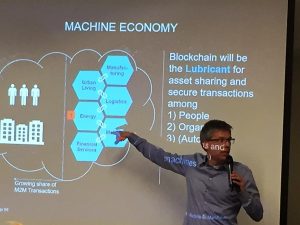A blockchain is a distributed database that is used to maintain a continuously growing list of records, called blocks. A blockchain is typically managed by a peer-to-peer network collectively adhering to a protocol for validating new blocks.
Functionally, a blockchain can serve as "an open, distributed ledger that can record transactions between two parties efficiently and in a verifiable and permanent way.” The ledger itself can also be programmed to trigger transactions automatically.
In a workshop held in London organised by the World Energy Council on 15 May, Mr Hesse outlined areas where blockchain technology can make a difference to the energy sector, including cybersecurity.
“Blockchain's security works not only because it's encrypted, but is also decentralised. Any attempt to interfere with the data would be immediately flagged and would require consensus amongst all participants/ nodes, making it very difficult for a hacker to achieve its aim.”
Although blockchain technology has the potential to transform processes in the utility industry, the major opportunity in the near term will focus on the changes within the energy industry.
Through its Energy Web Platform, EWF is developing an energy web platform market standard that ensures interoperability, which will reduce costs and complexity, will align currently dispersed blockchain initiatives, and will facilitate technology deployment through easy-to-implement applications.
In May, the Rocky Mountain Institute announced that ten energy companies from nine nations, including Sempra and Royal Dutch Shell, had joined the Energy Web Foundation, with a mission to accelerate the commercial deployment of blockchain technology in the energy sector.
With the fast adoption of smarts contracts sitting within blockchains, the future could see a rise of machines transacting with each other. It’s hard to talk about the future of blockchain without explaining the role smart contracts will play. If the world is going to run on blockchain, much of it will rely on smart contracts to execute the data exchanges and program in rules to govern how each code-triggered agreement works. Smart contracts are also a flexible mechanism that can serve as the blockchain middleman for all manner of agreements and data exchanges.
Earlier this year, the Innogy Innovation Hub that is part of Innogy SE, launched the Share&Charge initiative. Share & Charge enables people and small-to-midsize enterprises (SMEs) to share their charging stations, thereby helping to advance e-mobility and convert personal charging stations into money-generating machines. Share & Charge is following the vision of a global mobility transaction platform enabling seamless transport everywhere. It is the first global peer-to-peer (P2P) marketplace for electric charging enabled by blockchain.
Although blockchain technology is still in infancy stage, the emergence of new initiatives like the Energy Web Foundation, will help to speed up standards and create shared design between public and private companies. If the vision of what blockchain can do comes true, it could eliminate a lot of the complexities around managing distributed energy resources. The fact that major energy companies are allocating resources to understand it, is evidence that blockchain is worth paying attention to.








